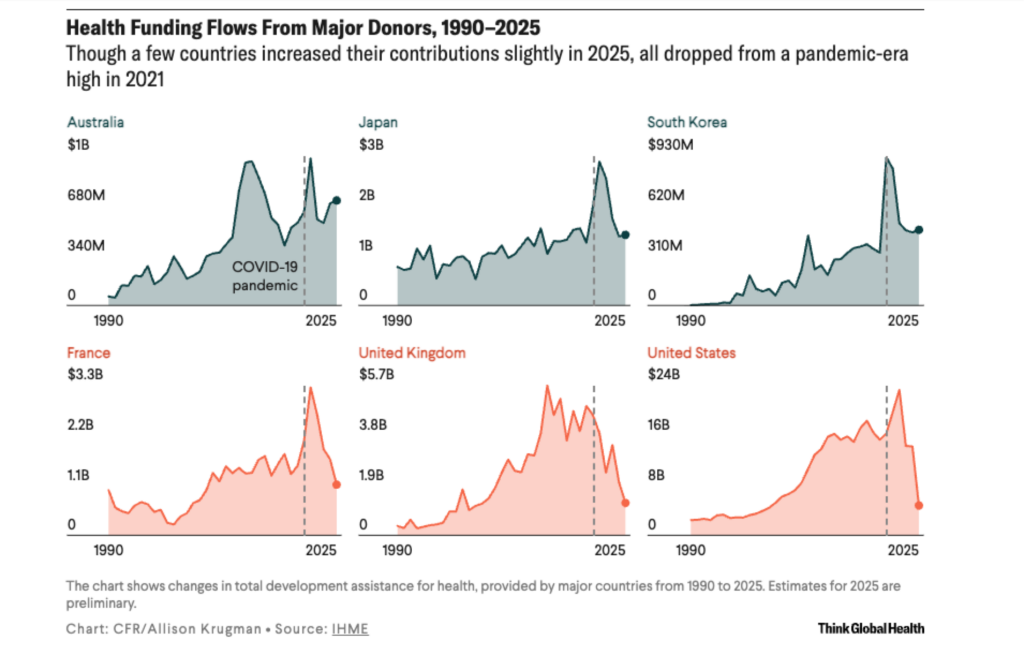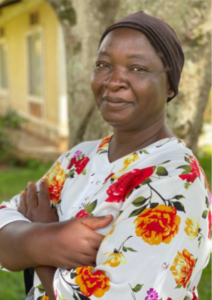As world leaders convene for the 80th session of the United Nations General Assembly (UNGA), participants will discuss their commitment to ending the HIV/AIDS epidemic, support for countries to achieve sustainability in their public health budgets, and new innovations like the revolutionary drug lenacapavir.
On Sept. 4, the President’s Emergency Plan for AIDS Relief (PEPFAR) announced an agreement with Gilead Sciences to introduce lenacapavir to two million pregnant and breastfeeding women in the highest-burden countries by 2028. This is a good move in the right direction and showcases how valuable public-private partnerships can push PEPFAR into the future. However, the program must continue this momentum to ensure more vulnerable populations have access to the drug, such as adolescent girls and young women, who account for 45% of new HIV infections. PEPFAR must forge sustainable pathways for country ownership and integration of long-acting prevention drugs.
To fulfill this global commitment and strengthen PEPFAR, U.S. policymakers should prioritize four key actions that I outline in the Bush Institute’s latest update:
- Appoint a U.S. global AIDS coordinator to ensure PEPFAR’s resources yield results and partner with governments and other stakeholders to combat authoritarian influence.
- Ensure PEPFAR gets back on track by scaling up treatment and prevention, tackling loss-to-care, and revitalizing mother-to-child transmission programs.
- Strengthen partnerships with local civil society and faith-based partners to ensure that resources flow directly to communities and to build resilience.
- Plan for 2030 and long-term sustainability by helping countries mobilize their resources and prepare to sustain progress beyond PEPFAR.
Tackling these challenges will move the world closer than ever to achieving the target of ending HIV/AIDS as a public health threat by 2030.
Figure of the Week
21%
That’s the decline in total funding for development assistance for health (DAH) between 2024 and 2025, according to a recent Think Global Health analysis. As the chart below shows, health funding contributions from major donors, including the U.S., France, and the United Kingdom, all dropped following a pandemic-era high in 2021. With just five years until PEPFAR’s 2030 goal, resilience and sustainability are crucial. A gradual phase-out of funding must allow countries to strengthen ownership while closing the gap in disease prevention and treatment.

Ally Updates
Physicians for Human Rights released findings from interviews conducted earlier this year in Uganda and Tanzania with clinicians, peer navigators, program managers, people living with HIV, and other health care workers following changes to U.S. foreign assistance and freezes to HIV programming. Findings included harm to individual physical and mental health through curtailed access to lifesaving HIV/AIDS prevention and treatment, reduced public health programming for HIV, and damage to public trust in U.S. partnership, antiretroviral medication, and domestic government.
Several interviewees documented antiretroviral dose-skipping and rationing of medications due to uncertainty in future supplies. These practices can lead to catastrophic results, including the transmission of drug-resistant HIV and women living with HIV transmitting the virus to their babies. One clinic reported seeing 25% of a cohort of HIV-positive pregnant women give birth to children infected with HIV by late April 2025 due to these practices.
The report also highlights the erosion of public trust in U.S. partnerships. Some respondents believed that abrupt changes in funding were part of a long-term plan to allow Africans to die from HIV. One peer navigator in Tanzania said, “…many of them [the clients] …have suspicions that the U.S. is targeting Africans…. [That] they are planning to reduce the population of Africans….” These perceptions strengthen similar narratives spread by authoritarian adversaries like Russia and China.
Importantly, the report shares the resilience and compassion of health care workers in both countries. During times of uncertainty, many continued to work despite being unpaid. The woman pictured below spent six months caring for clients without a salary in order to save lives.

Photo: Physicians for Human Rights
On the Brink of Catastrophe: U.S. Foreign Aid Disruption to HIV Services in Tanzania and Uganda
Bush Institute Insights
Between 2018 and 2021, the number of people living with HIV on antiretroviral therapy through PEPFAR partnerships grew by more than 4 million. By contrast, between 2023 and 2024, that growth was only about 130,000. Additionally, nearly one million people were lost to care in the first quarter of fiscal year 2025 alone. These data signal a growing concern about the number of people lost to care. Without stronger retention efforts, PEPFAR’s progress could widen into even further setbacks.
It’s not too late for PEPFAR and U.S. policymakers to reverse these trends. There are several steps the program can take to get back on track, including the quick appointment of a U.S. global AIDS coordinator, reestablishing data streams, finding gaps in program implementation across all populations and geographies, and addressing these gaps in real time.
You can read my full overview of the challenges the U.S. should prioritize addressing here.
In the News
- The National Association of Evangelicals is imploring members of Congress to maintain strong commitments to foreign investments that provide humanitarian relief, reports POLITICO. Margaret Schuler shared that World Vision, the world’s largest evangelical aid group, “has been forced to stop emergency humanitarian programs in all regions of the world, over 20 countries, leaving over a million people without emergency assistance” due to interruptions in funding.
- Russia is recruiting HIV-positive individuals, prisoners, and residents of Russian-occupied territories to replenish its military, reports the Kyiv Independent. Although Russian law exempts those with HIV, tuberculosis, and hepatitis C from service, recruiters are reportedly using social media and coercive tactics to promise bonuses and debt relief to these groups, as well as forming assault units with HIV and hepatitis-positive people. Many are sent to the front lines without medical support. These practices raise serious concerns for the treatment of vulnerable populations in conflict zones, such as Ukraine, where diseases like HIV and hepatitis are nearing an epidemic.
- At the 2025 Africa Health Sovereignty Summit, leaders emphasized the need for sustainable domestic financing models to protect recent progress as international developmental investment declines, reports Health Policy Watch. Proposals included redesigning the continent’s global health governance, establishing a health fund under the African Development Bank, and mobilizing local resources to plan for sustainability.
- AVAC released a new report, Getting PrEP Rollout Right This Time, which highlights actionable lessons from the rollout of oral PrEP, Dapivirine Vaginal Ring (DVR), and injectable cabotegravir (CAB) across Brazil, Kenya, Nigeria, South Africa, Vietnam, Zambia, and Zimbabwe. The analysis informs recommendations to strengthen regulatory pathways, normative guidance, demand generation, stakeholder engagement, and health system readiness to accelerate equitable access to long-acting PrEP.
- During its first meeting under the current administration, the Millennium Challenge Corporation (MCC) Board took decisive steps to reshape the agency and affirm its value in aligning foreign aid with strategic U.S. interests. The Board approved a new compact for Fiji and a threshold program in Tonga, reinforcing long-standing U.S. partnerships in the Pacific. Simultaneously, the MCC began phasing out some existing programs, particularly in countries previously flagged during the Foreign Assistance Review. Additional information on the termination will be announced following the required notifications to Congress.






























